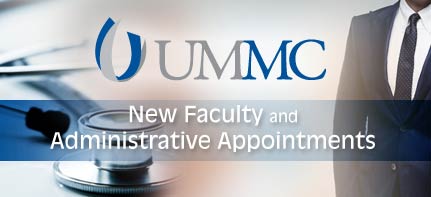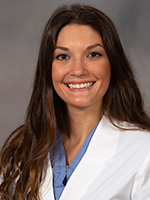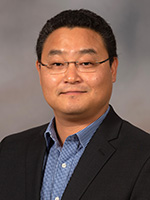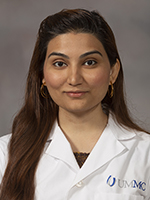- News
- Miscellaneous
- 2019
- February
- Feb. 14, 2019
Feb. 14, 2019
Speech pathologist, scientist, neuro onc fellow join faculty

Medical Center leadership is proud to announce the following additions to its faculty and leadership staff.
Whitney Armstrong, M.S.

Whitney Armstrong, an American Speech-Language-Hearing Association-certified speech-language pathologist, has joined the Medical Center faculty as an instructor in otolaryngology.
Armstrong received her B.S. in speech and hearing sciences from the University of Southern Mississippi in 2015 and her M.S. in speech and hearing from Southern Miss in 2017. As a graduate clinician, she completed a three-month clinical practicum in pediatric feeding and swallowing at Batson Children's Hospital in 2017 before joining an outpatient pediatric clinic in Pensacola, Florida.
Armstrong soon returned to the Jackson area and joined the UMMC staff as a PRN clinician. She currently treats the pediatric population at the Center for Advancement of Youth. Her clinical expertise includes treatment of developmental speech and language impairments in the pediatric population.
Hyun Joon Lee, Ph.D.

Dr. Hyun Joon Lee, a scientist III in the Department of Neurobiology and Anatomical Sciences at UMMC and director of the Histology Core Lab at the G. V. (Sonny) Montgomery VA Medical Center, has joined the Medical Center faculty as an assistant professor of neurology.
After receiving his B.Sc. from Hanyang University, Seoul, South Korea, in 2002, Lee earned his Diplom (M.Sc.) in biology in 2005 and his Ph.D. in molecular neurobiology in 2009 at the University of Hamburg, Germany. He then had a postdoctoral fellowship in the Department of Neuroscience at Georgetown University Medical Center, Washington, D.C., from 2009-11 and in the Departments of Neurology and Physiology at the Emory University School of Medicine, Atlanta, Georgia, from 2011-16. He joined the UMMC Department of Neurobiology and Anatomical Sciences and the G. V. (Sonny) Montgomery VA Medical Center in 2016.
An active member of the Society for Neuroscience and the National Neurotrauma Society, Lee is a peer reviewer for PLoS ONE, Neurobiology of Diseases and Scientific Reports. He has authored or coauthored several articles in peer-reviewed journals and has presented a number of posters at scientific meetings nationwide. His long-term research interest is the neural plasticity associated with pain and autonomic dysregulation following spinal cord injury. His current collaborations with UMMC scientists include reprogramming endogenous stem cells in the adult nervous system, developing novel peptide therapeutics in neurotrauma and understanding inflammation-induced autonomic dysregulation during pregnancy, among other topics.
Nawal Shaikh, M.D.

Dr. Nawal Shaikh, recently a neuro oncology fellow at the Feinberg School of Medicine, Northwestern University, Chicago, Illinois, has joined the Medical Center faculty as an assistant professor of neurology.
After receiving her M.B.B.S. from the Surat Municipal Institute of Medical Education and Research, Veer Narmad South Gujarat University, India, in 2008, Shaikh served as a resident medical officer at Wockhardt hospitals, Surat, India, in 2009 and had a clinical observership at Washington Medical Center, University of Washington, from 2010-11. She had a preliminary year of postgraduate education in internal medicine from 2012-13 and an adult neurology residency from 2013-16 at the Allegheny Network Medical Education Consortium, Pittsburgh, Pennsylvania, before her neuro oncology fellowship from 2016-18.
An active member of the American Academy of Neurology, the Society of Neuro Oncology and the American Society of Clinical Oncology, Shaikh is the author or coauthor of 10 posters presented at scientific meetings nationally, three articles in peer-reviewed publications, nine reviewed manuscripts for different journals and a book chapter in the Handbook of Brain Tumor Chemotherapy, Molecular Therapeutics and Immunotherapy.
A reviewer and author for Medlink Neurology, her research interests include neurological complications of cancer and cancer treatments; risk factor analysis and outcomes in patients with high grade glioma and epilepsy; and low grade gliomas.


